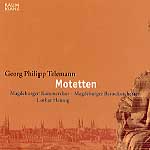Although rarely mentioned in the same adulatory breath as Bach or Handel, Georg Philipp Telemann deserves far more respect–and if several recent recordings (including this one) are indicative of a trend, it’s possible that he may be on the way to just recognition. The problem lies in the fact that Telemann’s music invariably rides in a perfect middle track between the deeply profound and often formidably heady expressions of Bach and the overtly theatrical products of Handel’s brilliant genius. But is this a bad thing? Only if you have a problem with exceptionally tuneful, richly sonorous, uncommonly inventive, artfully conceived music that sounds right, feels good, and never sounds cheap, recycled, or imitative. (Need we mention Vivaldi here?)
While it may be tempting to compare these works to the motets of Bach, the 16 compositions presented here, half of which are less than three minutes long, emerge from more utilitarian necessities, which makes them all the more remarkable for their individuality and their effectiveness as stand-alone concert pieces. Although most are in four parts, Telemann confidently manipulates his homo- and polyphonic textures to make it seem like we’re hearing more. You can start virtually anywhere in this program and find immediate pleasure, but the Laudate Dominum is notable for its luscious sonority; the following Werfet Panier auf im Lande is striking for its unusual rhythmic treatment; and the first version of Selig sind die Toten is a classic example of artful text setting.
Ich habe Lust abzuscheiden shows more than a hint of awareness of Bach’s lovely and intricately developed technique for setting a chorale melody. Bach’s Komm, Jesu Komm is recalled in Halt, was du hast, both in its double-choir structure and in its alternating phrases and juxtaposing of polyphonic and homophonic textures. Fürwahr, er trug unsre Krankheit, based on the tune “O Lamm Gottes unschuldig” (a favorite of Bach) is one of the program’s more lovely numbers, and the second of the Selig sind die Toten’s is a minor masterpiece, expertly crafted and drenched in beautiful sonorities. Es segne uns Gott is worthy of an interlude in Bach’s St. Matthew Passion, and Danket dem Herrn’s brilliant melodic and rhythmic character could have sprung from one of Handel’s more inspired utterances. And dare I say that the final Ein feste Burg ist unser Gott is on par with any number of Bach’s cantata-worthy creations?
Of course, the impact of all of this music would be far less impressive were it not for the superb singing of the Magdeburg Chamber Choir and the bright, finely tuned accompaniment provided by its instrumental partners, conducted with conviction and unflagging spirit by Lothar Hennig. The sound is first rate, and–except for the fact that texts are provided only in German–the packaging projects the high production values of the recording within. Don’t miss this. [2/6/2003]
































